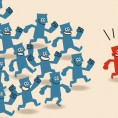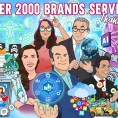Just ask Millennials speakers and Gen Y workforce trends experts: It’s a unique time in the workplace, today, where interactions span a large age demographic. To ensure success, it’s crucial that communication is effective and informed by knowledge of the unique needs of each generation. Given the three generations currently in the job force, Baby Boomers, Gen Xers, and Millennials, it might seem overwhelming at first. Thankfully Dan Schwabel, author of The New York Times Best-Seller Promote Yourself and founder of workplacetrends.com (one of today’s best-known Millennials speakers and Gen Y market research pros) spoke to us and revealed that each generation might not be as different as we suspect.
S: What are a few unexpected things people would never guess about members of this generation?
S: In our research, we found that Millennials choose in-person meetings over using technology to communicate. They aren’t so much different than other generations in that they share the same basic needs to belong and build relationships, yet technology has imprisoned them and hurt their soft skills. Millennials, unlike generations before them, are unsatisfied with just working full-time jobs and seek passion projects, consulting gigs, and other opportunities to express themselves outside of work.
S: How does this generation fundamentally differ from those which came before?
S: Since 2013, we’ve interviewed all four generations as to how they stereotype each other. We found that every generation negatively stereotypes younger generations, yet has a positive view of their elders. For instance, Millennials believe Generation Z is lazy, and Baby Boomers view Millennials as narcissistic, yet Millennials view Gen X and Boomers as wise. We believe this happens because older generations fear that newer generations will render them obsolete due to rapid changes in technology and behavior.
S: How might Millennials be unexpectedly similar to other generations in ways casual observers might not expect?
S: While research shows that Millennials can be narcissistic, older generations have adopted that same behavior. Between social networks like Facebook and Instagram, every generation is openly posting about their daily lives, hoping that the masses will like, share and comment. All generations rank “more money” first when it comes to selecting what company to work for and they are all suffering from workplace burnout due to the pressures of the new economy.
S: If we were to ask Millennials speakers, how are Millennials changing the way we communicate and interact?
S: Millennials are quick to adopt new technology and drop old technology, which forces older generations to change their habits in order to maintain their interactions with them. For instance, millennials are spending more time on Instagram and Snapchat now and less on Facebook, which is why Facebook acquired Instagram and wanted to acquire Snapchat for over a billion dollars. Millennials like to text and use instant messaging services and don’t bother with voicemails or phone calls. They write casually instead of in long form and older generations have had to adapt to these changes in communications habits.
S: How are Millennials changing the way we do business?
S: The biggest way millennials are changing the way we do business is that they are forcing companies to support social causes. In our research, we found that millennials want companies to focus on making a societal difference, not just more revenue. Companies have to think long and hard about their values and how they are supporting society if they want to attract millennial talent and consumers.
S: How is this generation changing the world? What kind of impact has it had on our society already?
S: Most Millennials give to charity in some way, shape or form. Millennial entrepreneurs such as Mark Zuckerberg, David Karp and Kevin Systrom have all changed the way we interact with each other and build businesses. What Millennials have taught us is that age doesn’t matter, ideas and execution does. Millennials are forming social organizations that are supporting all types of people from various countries. They have also forced companies to provide more flexibility and create environments where employees can have more fun and succeed.
S: What influences most shape Millennials today? What influences have shaped them in the past? How are they reshaping the rest of us, and other generations?
S: When it comes to the media, our research shows that millennials are most influenced by blogs, and only 1% say that a traditional advertisement makes them more loyal to a company. Millennials trust blogs because they are much more authentic and transparent over traditional media that is spun. Millennials are also heavily influenced by their parents who are still coddling them despite many millennials being over thirty years old now. They are also influenced by their peers and more likely to make a purchase based on social media status updates. Millennials are influencing older generations as they adopt new technology to be able to communicate with each other.
S: What are some of the best and most effective ways to connect with and speak to members of this generation?
S: The best way to connect with millennials is to either be a millennial, talk their language, or simply just treat them with respect despite their age. If you’re a manager, you should incorporate millennials into your discussions more so they feel like more a part of your organization. If you’re a company trying to sell to millennials, you should promote your values and how you support the community.
S: How do Millennials daily, social and professional habits differ from other generations – and what would those hoping to communicate with them do well to know about these shifts?
S: Millennials sleep with their phones, tablets, and wearables and are constantly texting and posting throughout the day. Aside from technology, millennials are similar to older generations in that they want to feel included, special and loved. The difference is their use of technology in order to solve their problems, from transportation to food. Knowing that they are always using technology, people and companies need to use those same devices and networks in order to connect with them and build relationships.
S: What advice would you give businesses or brands hoping to more effectively engage Millennials?
S: My advice to brands trying to engage Millennials is to treat them like any other potential consumer or employee, i.e. with respect. With Millennials, it’s important that you listen to them and take their feedback as you create products or new work practices. They want to be heard, involved in discussions, and you must show them how their work impacts the company because they seek meaningful work. Use technology in order to bridge the generation gap and give them the freedom and flexibility they need in order to be both happy and successful.
S: More and more Gen Yers are moving online for their news, information, shopping, and more. What’s the best way to capture their attention and interact with them these days?
S: If you want to build trust and loyalty with Millennials, then you should have a blog. They trust blogs because they are authentic and written by real people instead of an advertisement that is impersonal. Leverage your employees to create content around their expertise in order to connect with millennials.
S: What does success look like for today’s Millennial in your opinion, as one of today’s top Millennials speakers, and what’s driving them as they go about making decisions in business and life?
S: Millennials are searching for companies that o er meaningful work, a strong mission, flexibility and good values. They listen to their parents for career-related advice over their manager or teacher, which is why companies like LinkedIn have a “bring your parents to work” day. If you show their parents that you have a great place to work, they will follow. They make decisions based on their peer feedback and based on their passions and strengths. Even though they are getting married and having children later in life, they want to have families so work-life balance is important to them.
S: Anything we haven’t discussed that you’d like to add with regard to millennials that individuals or organizations should be aware of?
S: Millennials are the largest, most diverse, most educated and most connected generation ever. They will become 75% of the global workforce by 2025 and they have billions of dollars in spending power. By understanding their needs, your company can best market to and hire them.
For a more in-depth look at succeeding in a multi-generational workplace, you can check out Make Change for You, now available in paperback. Information for dynamic keynote speeches focusing on generations and millennial marketing is available at: www.akeynotespeaker.com/speaking/
GET YOUR FREE COPY NOW!
books
Limited-Time Offer: Download Free eBook THINK SMARTER Today!
No spam. We respect your privacy.














